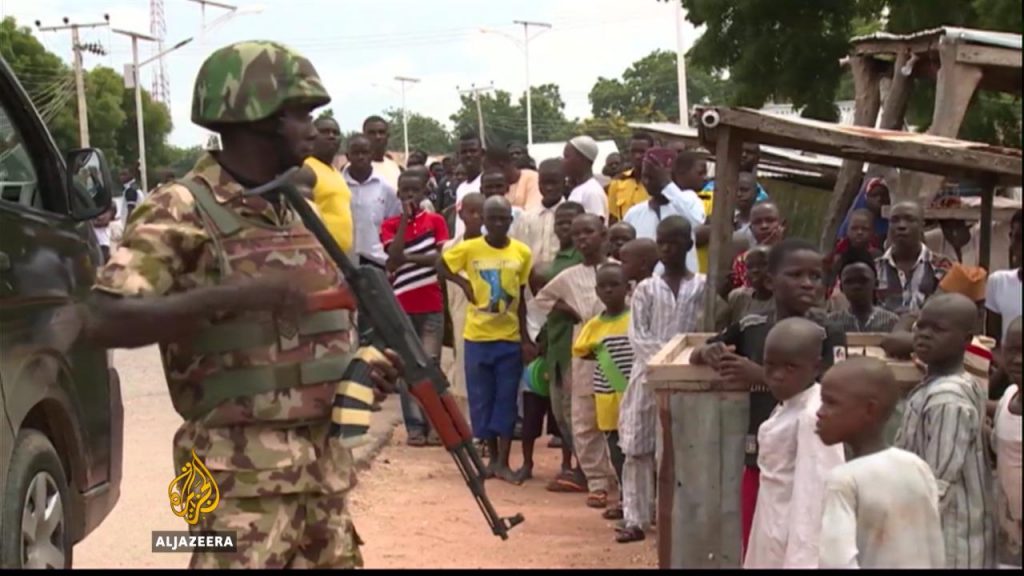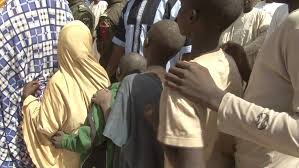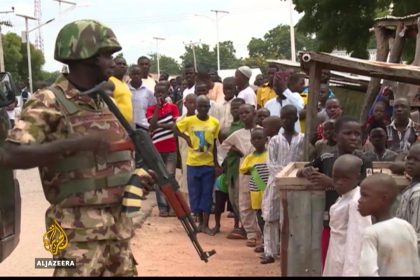


DAMNING REPORT:
‘NIGERIA Military holding CHILDREN as Boko Haram Suspects’-Human Rights Watch
…Thousands of adolescents held in Deplorable conditions
*Many detained without charge for months or years in squalid, severely overcrowded military barracks, with no contact with the outside world
*Children described heart-breaking woes of beatings, overwhelming heat, frequent hunger and being packed tightly in their cells with hundreds of other detainees
*Giwa Military Barracks in Maiduguri is Nigeria’s army most notorious torture chamber for Raping, Sexually molesting under-age girls
* Inside Document: ‘Fifteen of the children had been detained for more than a year, and some had been held for more than three years. None had been allowed to contact family members outside the detention center, nor had the authorities contacted their families’
* ‘The children said that Giwa has a cell for boys under 18 with children as young as 7, or even younger’
* “Children are being detained in horrific conditions for years, with little or no evidence of involvement with Boko Haram, and without even being taken to court”-Jo Becker, children’s rights advocacy director at Human Rights Watch
*Awaiting Nigerian Military’s response as at press time
BY CHARLES OGBEDE, SPECIAL CRIME EDITOR & GEORGE ELIJAH OTUMU/AMERICAN FOREIGN BUREAU CHIEF
HUMAN RIGHTS WATCH, A GLOBAL BODY THAT INVESTIGATES AND REPORTS ON ABUSES HAPPENING IN ALL CORNERS OF THE WORLD HAS CONDEMNED THE NIGERIAN MILITARY FOR REPEATED HUMAN RIGHT ABUSES, GROSS VIOLATION TO LIFE ACCESS AS contained in its 50-page detailed latest report on Nigeria where it detailed various crimes allegedly committed by the armed forces under the guise of ‘clamping down on Boko Haram activities in Borno State.
According to this shocking report, it revealed that the Nigerian military arbitrarily detained thousands of children in degrading and inhuman conditions for suspected involvement with the armed Islamist group Boko Haram. Human Rights Watch said many children are held without charge for months or years in squalid and severely overcrowded military barracks, with no contact with the outside world.
The 50-page report, “‘They Didn’t Know if I Was Alive or Dead’: Military Detention of Children for Suspected Boko Haram Involvement in Northeast Nigeria,” documents how Nigerian authorities are detaining children, often based on little or no evidence. Children described beatings, overwhelming heat, frequent hunger, and being packed tightly in their cells with hundreds of other detainees “like razorblades in a pack,” as one former detainee said.
“Children are being detained in horrific conditions for years, with little or no evidence of involvement with Boko Haram, and without even being taken to court,” said Jo Becker, children’s rights advocacy director at Human Rights Watch. “Many of these children already survived attacks by Boko Haram. The authorities’ cruel treatment adds to their suffering and victimizes them further.”
Giving a data sequential evidence on this report, Human Rights Watch stated that between January 2013 and March 2019, Nigerian armed forces detained over 3,600 children, including 1,617 girls, for suspected involvement with non-state armed groups, according to the UN. Many are detained at Giwa military barracks in Maiduguri, the main military detention facility in Borno State.
Nigerian authorities have released at least 2,200 children from detention, nearly all without charge. According to the UN, 418 children were detained in 2018, a significant decrease from 2017, when over 1,900 children were detained. Human Rights Watch does not know the number of children who may be currently detained.
On how to end this crisis, Becker said: “The Nigerian government should sign and put into effect a United Nations handover protocol to ensure the swift transfer of children apprehended by the military to child protection authorities for rehabilitation, family reunification, and community reintegration. Other countries in the region, including Chad, Mali, and Niger, have already signed such protocols.
“In June 2019, Human Rights Watch interviewed in Maiduguri 32 children and youth who had been detained as children at Giwa barracks for alleged involvement with Boko Haram. None of the children said they were taken before a judge or appeared in court, as required by law, and only one saw someone who he thought may have been a lawyer. None were aware of any charges against them. One was detained when he was only 5 years old.”
On the complicity of President Muhammadu Buhari’s administration in this saga, Human Rights Watch maintained that “Nigerian authorities arrested the children during military operations, security sweeps, screening procedures for internally displaced people, and based on information from informants. Many of the children said they were arrested after fleeing Boko Haram attacks on their village or while seeking refuge at camps for internally displaced people. One said he was arrested and detained for more than two years for allegedly selling yams to Boko Haram members. Several girls had been abducted by Boko Haram or forced to become Boko Haram’wives’.
Statistics showed that one-third of the children interviewed said security forces beat them during interrogation after their arrest or at Giwa barracks. One girl who was forced to marry a Boko Haram member said that after soldiers captured her, “The soldiers were beating us with their belts, calling us names and telling us they will deal with us because we are Boko Haram wives.” Others said they were beaten if they denied association with Boko Haram.
Children described sharing a single cell, approximately 10-by-10 meters, with 250 or more detainees. They said the stench from a single open toilet was often overwhelming and that detainees sometimes fainted from the heat. In Maiduguri, the average annual maximum temperature is 35 degrees Celsius and temperatures can exceed 40 degrees. Nearly half of the children said they saw dead bodies of other detainees at Giwa barracks. Many said they suffered frequent thirst or hunger.
Fifteen of the children had been detained for more than a year, and some had been held for more than three years. None had been allowed to contact family members outside the detention center, nor had the authorities contacted their families. Such cases may constitute enforced disappearances, a serious human rights violation.
The children said that Giwa has a cell for boys under 18 with children as young as 7, or even younger. The military also detains children in adult cells, where children said food and water were scarcer and conditions even more crowded. Very young children and babies are kept with their mothers and older girls in a separate cell. Three girls said they saw male soldiers making sexual advances toward female detainees or removing girls from the cell for long periods for what they believed was sexual exploitation. And rape had become a common attitude of the Nigerian military in this camp.
The military provides no formal education or rehabilitation activities for children at Giwa. Children reported that their only activities were prayer, watching television, and informal lessons that some children provided for others. The overcrowded conditions made physical activity impossible, and some children said they developed sores from restricted movement.
Following their release, some children said they suffered social stigma from presumed involvement with Boko Haram, even if they had no ties to the group. Nearly all said they wanted to go to school, but many said that available schools were too far away, or that they didn’t have money for transportation.
Nigerian authorities should immediately release children currently in military custody. If military or intelligence authorities have credible evidence of criminal offenses by children, they should transfer them to civilian judicial authorities to be treated in accordance with national and international juvenile justice standards.
“Nigeria faces formidable challenges from the Boko Haram insurgency, but detaining thousands of children is not the answer,” Becker said. “Children affected by the conflict need rehabilitation and schooling, not prison.”
As at the time of going to the press, Naija Standard Newspaper is still waiting for a response from Nigerian Military regarding this inhuman and degrading allegations against humanity.



